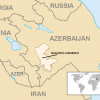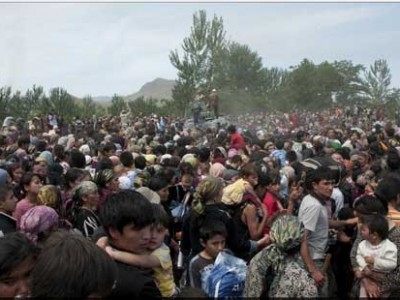Stories about Central Asia & Caucasus from June, 2010
Azerbaijan: Zhiguli
Sheki, Azerbaijan honors the Zhiguli, a Soviet era car, with a post remembering it as part of history.
Armenia-Azerbaijan: More Conflict Voices
As mentioned in previous posts on Global Voices, new and social media is increasingly playing a role in facilitating communication between Armenians and Azerbaijanis online. Locked into a bitter conflict over the disputed territory of Nagorno Karabakh, there are few other possibilities for connecting other than meeting in third countries.
Afghanistan: Drug use keeps on rising
Nick Fielding reviews a report from the UN's Office of Drug Control, which indicates that almost a million people in Afghanistan – roughly 8 per cent of the population between 15 and 64 years old – are drug addicts.
Kyrgyzstan: Constitutional Referendum, Pro et contra
Ekaterina writes [ru] (and Andrei translates) a analysis of the situation around constitutional referendum in Kyrgyzstan, which is expected to bring more legitimacy to the Interim Government.
Afghanistan: Parliamentary elections in the unstable country
Nasim Fekrat writes that out of the Afghanistan’s 364 election districts, only 11 are stable as the parliamentary elections scheduled for September 18 are nearing. The fact questions the vote's prospects amidst widespread insecurity.
Australians Challenge Afghanistan War Commitment
Even before Barack Obama sacked General McCrystal, Australia bloggers were questioning the commitment of troops to the Afghanistan war. This has intensified with the deaths of five soldiers in the last couple of weeks.
Kazakhstan: “Leader of the Nation” Mission Complete
As was reported, on May 13, the parliament of Kazakhstan adopted a set of amendments labeled as The Law on Leader of the Nation, as they were meant to attach such title to the incumbent president. Nursultan Nazarbayev, 69, rules the country for more than 20 years, since Kazakhstan was...
Afghanistan: Death of al-Qaeda's leader
Nick Fielding reports on the death of Sheikh Mustafa Abu al-Yazid in a US drone strike in North Waziristan, noting that it came as a huge blow for al-Qaeda, as soon as the man was the head of the organisation in Afghanistan since May 2007.
Afghanistan: Reintegrating Taliban fighters
Nick Fielding reviews a new report by the Lowy Institute for International Policy in Australia, devoted to the issue if the Afghan Government's reintegration and reconciliation efforts bring peace to Afghanistan.
Kyrgyzstan: Mixed news for KG sovereignty
Averroes analyzes the current Interim Government's ability to stabilize the situation in Kyrgyzstan autonomously and thinks which forces from abroad may be of help.
Kyrgyzstan: “The Prince” is Caught?
murzaki reports that the son of the ousted Kyrgyzstan President was detained by UK Border Agency, after he landed in Farnborough Airport. He was accused of embezzlement and abuse of authority and put on the “wanted” list of INTERPOL.
Uzbekistan: Aral Gas
Michael Hancock writes that the international consortium consisting of state-run Uzbekneftegaz, LUKoil Overseas, Petronas, Korea National Oil Corporation, and China National Petroleum Corporation found gas in the Uzbek part of the Aral Sea!
Tajikistan: US Opens Military’s Black Mountain Facility
Christian Bleuer is disappointed with the US Department of Defense’s chosen location for a new training facility in Tajikistan.
Kyrgyzstan: Info Wrangling on Osh Unrest
Christian Bleuer reviews press and expert opinions on the dramatic developments in southern Kyrgyzstan, focusing on the conflict roots and
Afghanistan: Fresh Allegations Against Karzai
Nasim Fekratْ reports that Taliban revealed information regarding its relationship with the Afghan authorities.
Kyrgyzstan: Provocateurs seen behind ethnic clashes
Clashes between the ethnic Kyrgyz and Uzbek population in the southern Kyrgyzstan have developed into large-scale violence. After three nights of shooting in the isolated conflict zone - the population still has limited access to telephony, electricity and food.
Kyrgyzstan, Uzbekistan: Initial Coverage of the “Osh Massacre”
On June 10, 2010, local clashes between the ethnic Kyrgyz and Uzbek population in the Kyrgyz part of the Ferghana valley turned into a full-blown massacre and further exodus of the Kyrgyzstan-based Uzbeks. It seems that the conflict had been incited by the Kyrgyz organized criminal gangs in order to destabilize the region and might be connected with the revolutionary events in Kyrgyzstan two months earlier. The post summarizes initial coverage of the event by local bloggers.
Kyrgyzstan: “I Call It a Massacre!”
English-language coverage of the situation in Kyrgyzstan – at neweurasia.net. Kyrgyz blogger writes: “Call it whatever you want, but I name it a massacre of Uzbeks in Osh and Jalalabad (Kyrgyzstan), which is, at the moment, still going on and the Interim government headed by Rosa Otunbaeva cannot do anything...
Armenia-Azerbaijan: Conflict Voices
In the 16 years since a ceasefire agreement put the conflict between Armenia and Azerbaijan over the disputed territory of Nagorno Karabakh on hold, successive attempts to broker a final peace have faltered. Could blogs and other online tools now offer alternative voices the opportunity to have their opinions on the conflict heard?
Armenia-Azerbaijan: Reflections on conflict and displacement
In a guest post on the blog of Global Voices’ Caucasus editor, The Caucasian Knot [EN/AZ/RU], Zamira Ayan Abassi reflects on life as an ethnic Azeri refugee from Armenia as a result of the conflict with Azerbaijan over the disputed territory of Nagorno Karabakh as well as her desire for...
Armenia-Azerbaijan: Finding mutual ground online
As Global Voices looks back at the success of a Rising Voices project, Ceasefire Liberia, a citizen media site dealing with conflict and reconciliation, activity in the same area is starting to be noticed in the Caucasus. New and existing projects working towards establishing dialog and eventual peace in the region are starting to use new and social media in their activities.




